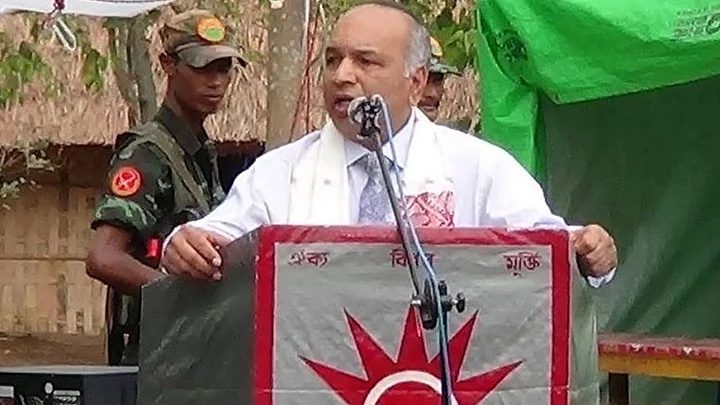A London-based medical practitioner who has been identified as the chairperson of the outlawed and anti-talks faction of the United Liberation Front of Asom (ULFA) (Independent) could soon be extradited to India.
Dr Mukul Hazarika alias Dr Avijit Asom, who is a citizen of the United Kingdom (UK), had been interrogated several times by UK government agencies in London over the past couple of months following an extradition request by the Indian government.
Both the countries have an extradition treaty inked in 1992, which means that he could be sent to India without being arrested. A source claimed that the extradition of the chairperson was almost ‘certain’ after the completion of the legal formalities in the UK.
A charge sheet was filed by the National Investigation Agency (NIA) at a NIA court in Guwahati in 2017 against Hazarika, chief of the armed wing Paresh Baruah and another functionary Gagan Hazarika. It was submitted after a case was registered on the basis of an order issued by the Ministry of Home Affairs. Both Gagan Hazarika and Baruah were declared ‘absconders’ by the court.
Dr Hazarika was charged under Sections 18, 18A, 18B and 20 of the Unlawful Activities (Prevention) Act and Sections 121A and 124A of the Indian Penal Code (IPC). The charge sheet alleged that ULFA(I) had been making serious efforts to revive terrorist activities by recruiting new cadres, organising camps, training sessions and raising funds through extortions and kidnappings with the goal to wage a war against the government.
Another source emphatically claimed that Dr Hazarika’s lawyers in London have submitted a petition to the UK government opposing his extradition to India where he could face a harsh penalty.
In all likelihood, Baruah knew that the chairperson would land in trouble which was why he issued a press release early in September declaring Dr Hazarika as a ‘fictitious character’ who never existed. He told a journalist on phone that the photograph of Dr Avijit Asom that had been circulated and published was of Dr Mukul Hazarika, who is a doctor by profession and a human rights activist.
The press release was issued three days after ULFA(I)’s organisational structure was revamped where Dr Hazarika did not find mention in the list of officer bearers. Baruah made himself the president of the ‘supreme council’ above two more committees.
ULFA(I) had declared a unilateral ceasefire with the government in May for three months, which was extended in August. Baruah has also indicated that he would be willing to engage in talks with the government for a negotiated settlement after years of spurning the path of dialogue with the government.
Dr Hazarika, in his early 70s, hails from Kaliabor in central Assam. He migrated to the UK after completing his MBBS from Gauhati Medical College in 1972.
Hazarika had already started campaigning for ULFA at some global forums in Europe even before he came into contact with the outfit’s general secretary Anup Chetia in 1995. The occasion of the meeting was the UN-sponsored World Summit for Social Development at Copenhagen, held during 6-12 March, where Chetia participated as an environmental activist from Bangladesh.
Subsequently, Dr Hazarika’s links with ULFA were strengthened after he introduced the outfit to an NGO called Liberation and helped it to secure membership with some other organisations in Europe. The campaign at these forums was severely weakened after ULFA abducted Sanjoy Ghose from Majuli, which provoked sharp reactions among different organisations across several countries. Ghose disappeared never to be traced again.
Dr Hazarika’s association with ULFA was not known to many people until 2011 when he shot into prominence as Dr Avijit Asom as the acting chairperson of the independent or anti-talks faction led by Baruah. Two years later, he was appointed chairperson of the group after Arabinda Rajkhowa was expelled for engaging in talks with the government. Rajkhowa, on his part, was already heading his own faction that included a majority of the senior leaders apprehended in Bangladesh.
In 2016, Dr Hazarika visited ULFA(I)’s council mobile headquarters in Myanmar’s Taga and interacted with the leaders from rebel outfits of Manipur. A photograph of him delivering a lecture at the camp was also published by the media.
After Dr Hazarika is extradited to India, the government might explore the possibility of his engagement in the peace process with the faction headed by Arabinda Rajkhowa that has already reached an advanced stage.
Speculation is rife about his fate among some over-ground rebel leaders who feel that he could also be asked by the government to explore the possibility of bringing Baruah to the negotiating table.
(Rajeev Bhattacharyya is a senior journalist in Assam. Views expressed are personal.)
(At The Quint, we question everything. Play an active role in shaping our journalism by becoming a member today.)
